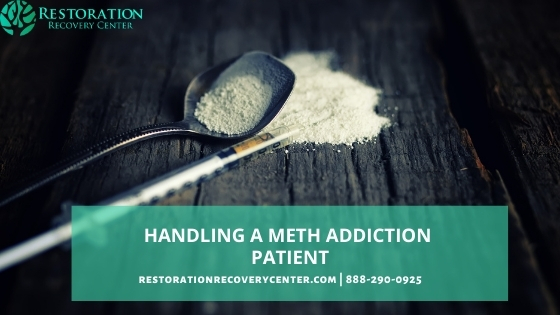Handling A Meth Addiction Patient
Recognizing that your loved one has a meth addiction is a very important step.
If the addiction problem can be identified soon enough, the better the chances to enroll them into a treatment program and bring their lives back to order. In this post, we are going to discuss how to handle a meth addiction patient and how they can be empowered to handle triggers.
Everybody has their own imaginative picture of how a meth addict looks like. Do some think all meth addicts look thin and sickly? As much as this might be true in some cases, believe it or not, there are meth addiction patients who look totally healthy, with no visible problem.

meth addiction
Some people think that a meth addiction patient would be incapable of holding down a job or a relationship. In some cases, they struggle to stay in employment or relationships, and others are even homeless. However, not all meth addiction patients fall under this category of dysfunction. If they do not Get Help from A Meth Addiction professional, meth addiction patients always end up in one of the above categories.
Realizing that your loved one has a problem with meth addiction is a nuanced responsibility. You will be required to look beyond the stigma and be compassionate to understand their situation.
Being close to a family member will help you to notice any change in their behavior, appearance, and you can pick out a few tell-tale signs of addiction to meth. Helping a loved one overcome their addiction to meth is a big responsibility considering that some of your efforts might not be productive. This is why it is mandatory to understand how to handle meth addiction. The patient needs to undergo a detox program safely and learn ways to deal with triggers to avoid relapse.
How to tell if your loved one is addicted to meth
Even when a meth addiction patient looks fine and healthy, without an early intervention, they can have severe mental and physical complications down the road.
Some of the common health issues affecting these individuals include heart attacks, strokes, seizures, hallucinations, delusions, eating disorders, and sometimes death. Methamphetamine will speed up your body’s nervous system, affecting your heart rate, breath, blood pressure, temperature, and your level of energy.
Since meth is a very addictive substance by nature, the drug is used as a stimulant by recreational users. Over time, they tend to increase their dosage for better results. No matter the amount a person ingests, the damage can be severe, especially if not treated.

meth addiction
Addressing the Dangers of meth addiction
The most effective meth addiction treatment programs involve intensive support for the patient’s physical, emotional, behavioral, and psychological symptoms. It also includes long-range constructive developmental coping strategies, especially for subjective symptoms of withdrawal, the cravings and possible psychosis, depression, anxiety, and aggression.
The best method of ensuring a safe transition from the addiction is through a supervised detox program.
Even after the patient is clean, the risk of relapse is still high. Professionals recommend a long-term residential treatment program to help the patients build a strong foundation for a sustainable recovery. Making a decision to undergo several cognitive-behavioral therapies plus a series of psychotherapy modalities, a reliable peer support system, and family involvement, meth addiction patients will discover strength from different areas of their lifestyles, that will help them manage the stressors and triggers that might lead to a relapse.
Addressing the Value of Constructive Relationships
Unfortunately, in most cases, actions that we take to help a loved one overcome their meth addiction can have adverse or more damaging effects.
If a person is struggling to earn a living, but they still have the problem of meth addiction, pulling them back, supporting them financially may actually be fueling their destructive behaviors even more. The best approach would be to take them to an Addiction Recovery Center in Auburn California where they can access professional help.
Successful treatments are better felt when the individual is willing to partake in the treatment voluntarily. This is to say that the treatment path is only valuable if the individual patient can actually see it.
For more information on how to handle meth addiction in a loved one, reach out to the Restoration Recovery Center in Auburn today!






